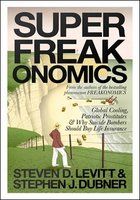“Superfreakonomics” by Steven Levitt and Stephen Dubner is a sequel to their successful book Freakonomics. Like that book, this one too uses some of the principles from economics to answer a number of questions pertaining to our lives. If you enjoyed that book, this book is more of the same, though much less interesting in my honest opinion. Of course, this could well be due to the number of books that have been published since the original book came out and that explore very similar topics.
Some of the chapters have intriguing titles like “How is a street prostitute like a department-store Santa?” or “Why should suicide-bombers buy life-insurance?” and manage fairly well to apply data and economic principles to justify their conclusions. Unlike the first book however, none of the results presented here are startling enough. The effect is like reading a second-rate story where you can predict pretty well the plot-twists that the writer has in store for you. This is not to say that the results are not insightful, just that they are not that surprising.
If you have read The Tipping Point, the chapter on apathy and altruism (eventually) provides a very different view of the Kitty Genovese murder. The chapter on global warming is already quite controversial. That chapter also goes overboard by being a little too gaga about Intellectual Ventures, a company known as a patent troll in many a quarter.
Some of the use of statistics in this book is decidedly dodgy and that gives me an uncomfortable feel about it. It reminds me of Felix Salmon's review of the preceding book. For example, they conclude that drunk-driving is safer than drunk-walking based on the reported rates of deaths for each mile traveled (see their explanation). This not only has the obvious problem that drunk drivers also endanger others while drunk walkers usually endanger only themselves, but it also seems to gloss over the fact that these are usually not comparable choices, except when the distances are very short. (To be fair, they recommend taking a cab over drunk-driving, with which I can agree whole-heartedly.)
As another example, they note that one of the ways to boost your longevity is to get a Nobel prize if you can, since prize-winners have been observed to live very long. A much simpler explanation for the longevity of Nobel-prize-winners could be that since these prizes are not awarded posthumously and are only awarded for innovations that have “stood the test of time” (translating into a gap of 20 years or more between the innovation and the prize), only those who live long enough usually manage to get this prize.
On the whole, this is a mildly interesting book that is worth a read, but only if you critically think through the material in each chapter and supplement it with alternative viewpoints from around the web. The authors should also stop writing any more books in this series.
